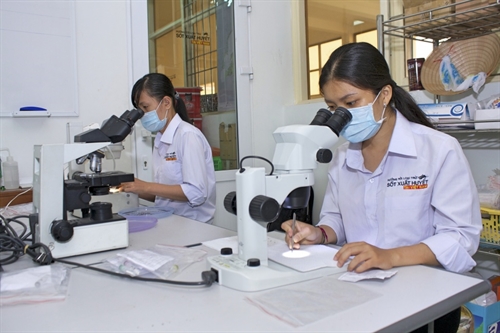 Society
Society

Health experts from Việt Nam and Australia have exchanged medical knowledge at a conference on health services and medical science that began on Tuesday in Hà Nội.
 |
| Health workers conduct dengue fever prevention research in Khánh Hòa Province under the framework of a health co-operation project between Việt Nam and Australia. — Photo eliminatedengue.com |
HÀ NỘI — Health experts from Việt Nam and Australia have exchanged medical knowledge at a conference on health services and medical science that began on Tuesday in Hà Nội.
The two-day event, entitled Health Services Việt Nam – Australia 2016, is jointly organised by the Ministry of Health and the Australia Embassy in Việt Nam.
Speaking at the opening ceremony, Australian Ambassador in Việt Nam Craig Chittick said that health was one of the priority areas under the Agreement on Scientific and Technological Cooperation between Việt Nam and Australia ratified in July 2014.
“Việt Nam and Australia have a long standing education relationship built largely on scholarships, which has now become increasingly diverse. As Việt Nam builds its research capability, internationalises its university sector and modernises its health sector, Australia stands ready to partner with Việt Nam on its health and medical priorities and industry development,” Chittick said.
Deputy Minister of Health Lê Quang Cường said that an agreement on science and technology cooperation was ratified in 2014 and health was one of the priority areas identified under the agreement.
“Practical recommendations and suggestions from all delegates and speakers from Việt Nam and Australia could be made to strengthen and promote co-operation in health between the two countries,” Cường said.
According to Cường, the Australian government and non-governmental organisations have offered valuable support to the health sector in Việt Nam. This support focusses on areas such as HIV/AIDS, strengthening the preventive medicine system, improving environmental health, and training human resources.
During the event, participants will focus on discussing a range of topics including non-communicable diseases and stem cell research, improving the quality of medical and healthcare services through innovation in technology, and on Việt Nam’s healthcare education, service delivery and financing reforms.
It is also a chance for both sides to evaluate the co-operation potential in improving research capacity in medical innovations, linkage between research activity and consultancy, and making policy for the prevention of non-communicable diseases, in addition to quality improvement of healthcare services and hospital administration, and application of stem cell technology and innovation in medical training system. — VNS




